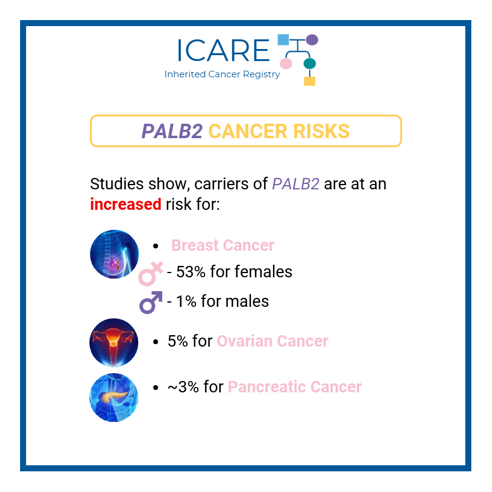 A newly published study of 524 families with pathogenic PALB2 mutations from around the world, including almost 50 ICARE participants, represents the largest, most comprehensive effort to evaluate cancer risks.1 Results showed increased risks for female breast cancer (53%), ovarian cancer (5%), pancreatic cancer (2-3%), and male breast cancer (1%). Findings did not suggest higher risks for prostate cancer or colorectal cancer. Additionally, the risks of breast cancer were highest for younger women and declined with age. Results from this study confirm PALB2 to be an important breast cancer gene, with risks overlapping with BRCA1/2, and highlight the importance of breast cancer risk management among individuals with PALB2 mutations.
A newly published study of 524 families with pathogenic PALB2 mutations from around the world, including almost 50 ICARE participants, represents the largest, most comprehensive effort to evaluate cancer risks.1 Results showed increased risks for female breast cancer (53%), ovarian cancer (5%), pancreatic cancer (2-3%), and male breast cancer (1%). Findings did not suggest higher risks for prostate cancer or colorectal cancer. Additionally, the risks of breast cancer were highest for younger women and declined with age. Results from this study confirm PALB2 to be an important breast cancer gene, with risks overlapping with BRCA1/2, and highlight the importance of breast cancer risk management among individuals with PALB2 mutations.
1Yang, et al. J Clin Oncol. 2019 Dec. DOI: 10.1200/JCO.19.01907.
Social media post: https://tinyurl.com/ICARE20191216
Video of Dr. Marc Tischkowitz (Senior Author):
